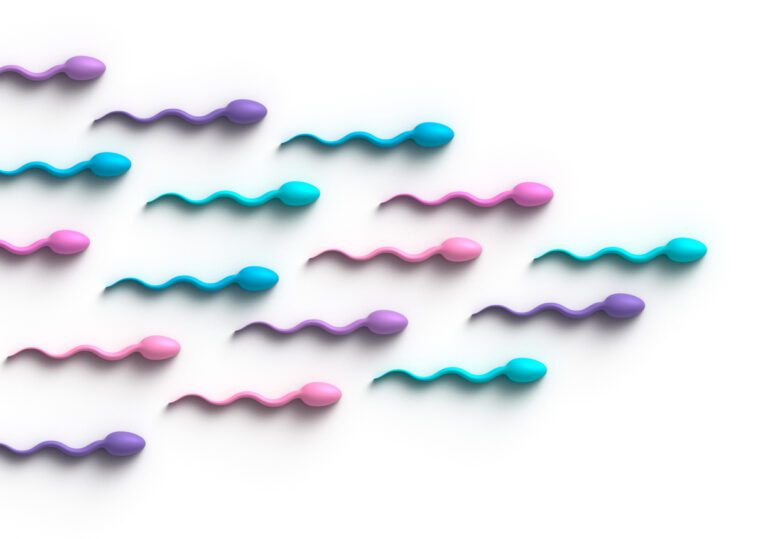Male Infertility Explained

Dr Mahalakshmi Ragunath sheds light on the topic of male fertility, including lifestyle choices that can impact fertility, how a diagnosis is made, and pursuing fertility treatment with a diagnosis of male infertility.
What is male infertility?
One in six Australian couples struggle to conceive. Male infertility is one of the leading causes, being solely responsible in approximately 1 in 5 cases, whilst 1 in 3 is a combination of both male and female factors. In most instances, there are no obvious signs or symptoms to indicate male subfertility if a semen analysis is not available.
There are several factors that can contribute to male infertility, as in the production, quality and transportation of sperm and this can include:
- Genetic causes
- Functional problems (such as erectile dysfunction)
- Some medications
- Age
A semen sample can be described as one of the below:
- Azoospermia: No sperm present
- Oligospermia: Low numbers of sperm present
- Asthenozoospermia: Low sperm motility
- Teratozoospermia: Sperm are formed abnormally
- Oligoasthenoteratozoospermia- which encompasses everything

How lifestyle impacts sperm
Some lifestyle choices can have a significant impact on the quality or function of sperm. The good news is that whilst a lot of the issues can be reversed with the adoption of healthy pre-conception lifestyle choices, seeking fertility help early is important. Antioxidant supplements may also help but you should seek the guidance of a fertility expert to help you with this.
Smoking
Smoking poses significant health risks to an individual and can contribute to sperm damage. It is recommended to stop smoking at least a few months before trying to conceive. Second hand smoke can also present health risks to the female partner while pregnant or trying to conceive.
Alcohol
In men, alcohol consumption can reduce the likelihood of conception through impotence and reduced libido. It may also affect sperm quality.
Obesity
Studies show that overweight or obese males have lower sperm counts than males of a healthy weight. Men who are significantly overweight may also have more difficulty maintaining an erection.
Recreational drug use
Use of steroids can cause male sterility that may have lasting effects. It is strongly recommended to not use steroids for at least two years before trying to conceive as they can shrink the testes and stop sperm production. Having a semen analysis early may help.
Other recreational drugs, like cannabis and cocaine, can impact sex drive and libido, as well as contributing to other negative health effects and should be considered.
Diagnosing & Treating Male Infertility
In order to receive a diagnosis of male infertility, a Fertility Specialist may perform the following tests:
- Blood tests
- Physical examination
- Semen analysis
- Ultrasound
In many cases male infertility is addressed with Assisted Reproductive Techologies (ART), such as ICSI ( intra cytoplasmic sperm injection ) rather than treatments that seek to resolve the specific causes of infertility, as only one in eight infertile men have a treatable condition.
ICSI is a procedure that is performed as part of the IVF treatment cycle the woman undergoes and unlike a typical IVF cycle, this is followed by a single sperm being injected into the cytoplasm of a mature egg using a minuscule needle. On the day of the female’s egg collection, the male will typically provide a fresh semen sample. In some cases, where there is a complete absence of sperm in the ejaculate the man may have to undergo a surgical sperm retrieval procedure, depending on assessments completed by a fertility specialist or GP.
Over the following days, eggs will be monitored for fertilisation and after embryo culture to 3-5 days a viable embryo is chosen to be placed into the woman’s uterus.
Getting help with fertility
If you’re ready to start your family, reach out to our team to make an initial appointment with one of our GP’s, or talk to your regular GP about getting a referral to one of our Fertility Specialists. Contact us


About Dr Mahalakshmi Ragunath
MBBS; DGO; MRCOG; MSc; FRCOG; FRANZCOG
About Dr Mahalakshmi Ragunath
MBBS; DGO; MRCOG; MSc; FRCOG; FRANZCOG
Mahalakshmi Ragunath (Maha) is a Consultant in Reproductive Medicine and Gynaecology at Adora Fertility and continues to work as a Consultant in Obstetrics and Gynaecology at SJOG Midland.
Maha was trained in the UK, and obtained her specialist certification from the Royal College in Obstetrics and Gynaecology as well as special interest training in Subfertility, Assisted Conception and Laparoscopic surgery modules.
Maha is skilled in all types of fertility treatment options including IUIs, Ovulation induction and IUI, Egg freezing, IVF treatment, egg donation cycles and surrogacy, with a special interest in the management of recurrent treatment failure, poor ovarian reserve PCOS and Male infertility. Above all, putting patients’ interests first and supporting them through a difficult time, is very important to her.



